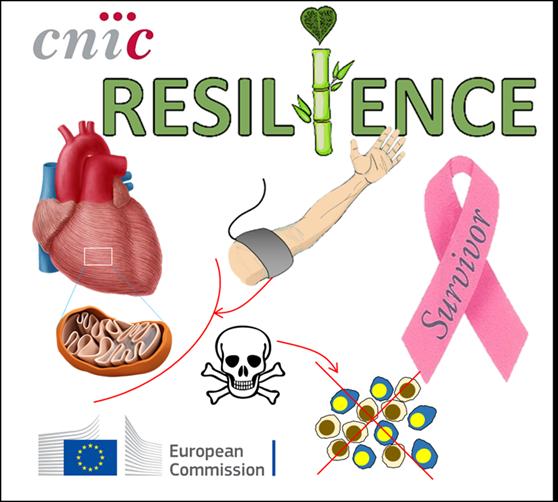Over one million European cancer patients suffer from side effects to chemotherapy

Credit: CNIC
Cancer patients are a vulnerable population prone to develop cardiovascular complications. Among other factors, some anticancer therapies can induce adverse cardiovascular effects. Every year, more than 3 million Europeans receive anthracyclines alone or in combination with other anticancer agents. Anthracyclines are a frequently prescribed anticancer agent that can induce an irreversible toxic effect on the heart may lead to chronic heart failure in ?5% of the cases. It is estimated that in Europe the prevalence of chronic heart failure secondary to cancer therapy-related cardiotoxicity is ?1 million people. The trade-off between cancer and chronic heart failure is a massive psychological burden. For healthcare systems, the growing incidence of chronic heart failure has devastating consequences.
The two major unmet clinical needs related to anthracycline-induced cardiotoxicity are the lack of therapies to prevent or cure this condition, and the lack of markers to identify the problem in its early stages. RESILIENCE (REmote iSchemic condItioning in Lymphoma patIents rEceiving aNthraCyclinEs) will tackle these challenges aiming to reduce the burden of cardiovascular disease in cancer survivors.
RESILIENCE is a multinational project funded by the European Commission through the H2020 “Health, Demographic Change and Wellbeing” programme. Eleven partners from six EU countries (Spain, France, The Netherlands, Portugal, Germany, Denmark) will work together under the coordination of the Spanish National Centre for Cardiovascular Research (CNIC). RESILIENCE consortium is a multidisciplinary group, including experts in cardiology, haematology, cardio-oncology, and medical imaging. The consortium includes internationally renowned institutions and leaders with a history of participation in trials both in the field of haematology and cardiology. Different stakeholders caring for cancer patients are represented in the consortium: doctors, nurses, technologists, companies in the imaging industry, scientific societies and, importantly, patient associations.
The project received a six million EUR grant to perform a randomised clinical trial testing the role of “remote ischaemic preconditioning” as an intervention to prevent the development of anthracycline-induced cardiotoxicity. To this aim, more than 600 patients recently diagnosed with Non-Hodgkin Lymphoma (NHL) scheduled to undergo chemotherapy with anthracyclines will be enrolled in 17 hospitals across the six EU countries. Patients will be randomly allocated to “remote ischaemic conditioning” (one weekly session during the four-month span of chemotherapy) or to a sham intervention (control). Cardiac function will be evaluated throughout the duration of the study. “Remote ischaemic conditioning has been shown to be extremely effective in preventing anthracycline-induced cardiotoxicity in large animal models of the disease, and this project is the translation of this therapy to patients at risk for developing cardiac complications,” says Borja Ibáñez, the Principal Investigator-Coordinator of RESILIENCE. The investigator explains that “the hypothesis behind this study is that remote ischaemic conditioning, an intervention consisting of repetitive brief episodes of arm ischaemia induced by inflating a blood pressure cuff for five minutes, followed by pressure relief, can diminish side effects. The substances released by the arm in response to this intervention reach different organs (the heart in this case) and make them more resistant to injuries, such as the exposure to anthracyclines.” Remote ischaemic conditioning has been tested in many trials before, although in different conditions, such as myocardial infarction or stroke. This is the first time that this intervention is tested in a large, randomised trial of cancer patients undergoing chemotherapy with anthracyclines.
Another unique aspect of the RESILIENCE project is the use of state-of-the art cardiac magnetic resonance (CMR) imaging provided by an industrial partner 1, to evaluate the impact of the intervention on cardiac function and composition. Patients enrolled in the trial will undergo three CMR studies before, halfway and after the four months of chemotherapy. By executing a comprehensive imaging study, the team will be able to validate a novel CMR-based marker of early cardiotoxicity, previously identified by some members of the consortium. The CMR protocol will also include another validation of a revolutionary CMR acquisition technique that can massively reduce the time of a CMR exam, from 45 minutes to less than one minute. This methodology will be tested for the first time in a multicentre international environment.
Dissemination is a key aspect of the RESILIENCE project, which seeks to reach not only the medical and scientific communities, but also the public and patients. Besides its presence in medical fora, the project will be active on social media to reach beyond classical boundaries. A dedicated Mobile App will be developed to increase patient engagement. Among other activities, the project includes multinational meetings bringing together consortium members, world leaders in the field of Cardio-Oncology, industry, specialised press and patients enrolled in the study. These meetings will take place at the European Society of Cardiology (ESC) headquarters in Sophia Antipolis. The ESC is a member of the consortium through the Council of Cardio-Oncology and will play a key role in the dissemination and communication activities of the project.
In RESILIENCE, patients will participate actively via direct contact with investigators, giving input on pre-defined measures of the study, and as full consortium members in meetings. Natacha Bolaños, European Manager of Lymphoma Coalition Europe (LCE) 2 says: “we will guarantee that the patient´s perspectives are always considered in any activity of this unique project.”
###
References:
1 Philips, the industrial partner of this project, will provide the latest technology for the development of the project.
2 Lymphoma Coalition Europe (LCE) is a worldwide non-profit organisation consisting of network of lymphoma patient groups with deep penetrance in most of European countries through local members.
Media Contact
Fátima Lois
[email protected]




